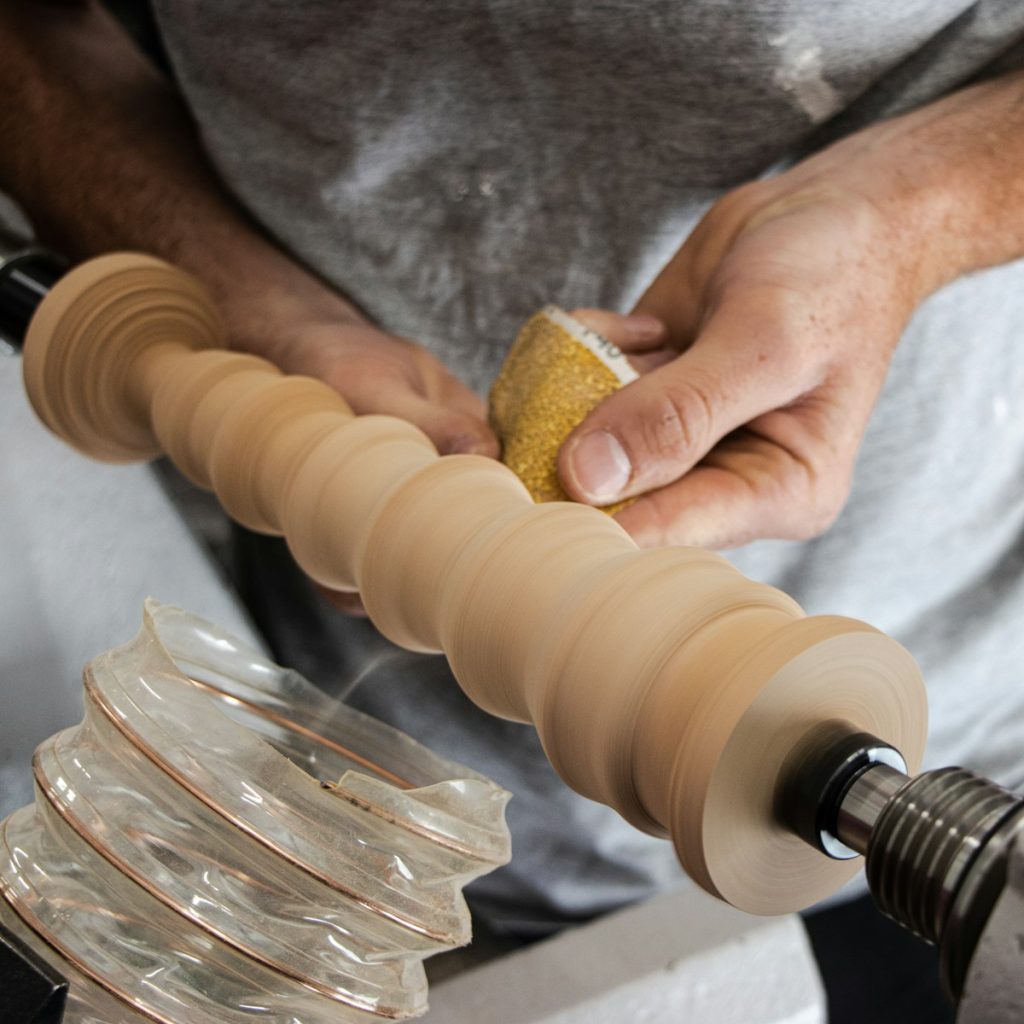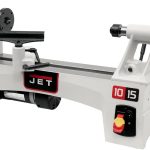Here are 10 beginner-friendly lathe projects that can help you build your skills while creating useful or decorative items:
1. Wooden Pens
- A great starting project for learning precision and control. Pen blanks are easy to manage, and you can use different woods to experiment with grain and finish.
2. Bowls
- Simple bowls allow you to practice shaping curves and honing your turning skills. Start with small pieces and gradually move to larger bowls as you improve.
3. Candle Holders
- Turning candle holders is a straightforward project that introduces spindle work. You can create unique designs and experiment with various wood finishes.
4. Bottle Stoppers
- Quick and easy to turn, bottle stoppers allow for creativity in the shape and finishing. They’re also functional, making them great gifts.
5. Honey Dippers
- Small and simple, honey dippers are fun projects for learning spindle-turning techniques. Their basic shape provides room for practicing consistent cuts.
6. Rolling Pins
- Another spindle project, rolling pins are practical and offer a way to work on smooth, symmetrical turning. You can vary the shape and thickness for different styles.
7. Wooden Mallet
- Creating a mallet introduces a combination of spindle and faceplate turning. This project helps build skills in turning different shapes into functional tools.
8. Salt and Pepper Shakers
- These require some precision drilling and turning. They are great for practicing hollowing techniques and symmetry.
9. Goblets
- A more advanced beginner project, goblets offer practice in hollowing out the cup and shaping the stem, combining spindle and faceplate work.
10. Ornaments
- Turning small ornaments can help you master detailed work. These projects are fun, especially around holidays, and can be great gifts or decorations.
These projects can help you get a feel for the lathe, sharpen your skills, and learn various turning techniques while producing beautiful and useful objects.
Here’s an expanded look at some of the beginner-friendly lathe projects mentioned earlier:
1. Wooden Pens
- Details: Pen turning is an excellent introduction to the world of woodturning. You’ll need a small blank of wood or acrylic, a pen kit (available online or at woodworking stores), and specific pen-turning tools.
- Skills Learned: This project teaches precision turning, sanding, and finishing techniques. Its small size makes it easy to control and manage, perfect for beginners who want to focus on detail work.
- Tips: Start with softer woods before moving to harder materials like acrylic or exotic woods to practice shaping.
2. Bowls
- Details: Turning wooden bowls is a staple for most woodturners. Start with small bowls and move to larger ones as your skills improve.
- Skills Learned: You’ll practice faceplate turning, controlling cuts, and refining curves. Bowl turning teaches you how to use gouges effectively for shaping the interior and exterior.
- Tips: Use a bowl gouge to create smooth, curved surfaces. Starting with softwoods like pine can help you get comfortable with the shaping process before tackling hardwoods.
3. Candle Holders
- Details: Candle holders are simple projects that allow you to practice spindle turning (for the base and stem) and hollowing (for the candle hole). These are versatile, as you can experiment with different designs, sizes, and finishes.
- Skills Learned: This project emphasizes symmetry and consistency in shaping the stem. It’s also a great way to learn about different finishes, such as staining or oiling, to protect the wood from heat and wax.
- Tips: For a cleaner finish, make sure to sand thoroughly between each step and apply a protective finish like beeswax or Danish oil.
4. Bottle Stoppers
- Details: Turning bottle stoppers is a fun, quick project that can be done with small wood blanks. Bottle stopper kits are readily available, which include the metal base that screws into your turned wooden shape.
- Skills Learned: This is great for spindle-turning practice. The project requires shaping a small, decorative top, which can be rounded or geometric, depending on your creativity.
- Tips: Start with a basic design before experimenting with intricate details. You can also incorporate resin or use different types of wood for variety.
5. Honey Dippers
- Details: Honey dippers are simple, functional kitchen tools made by turning wood into long, cylindrical handles with grooved heads to hold honey.
- Skills Learned: Spindle turning and working with small, detailed grooves. This project requires you to practice cutting consistent rings, which is a foundational woodturning skill.
- Tips: Practice making clean, consistent grooves in the head of the dipper. You can experiment with different sizes and styles for the handle.
6. Rolling Pins
- Details: A rolling pin is a practical spindle project where you’ll turn a large, even cylinder. You can choose to make a straight or French-style tapered rolling pin.
- Skills Learned: Focus on achieving an even diameter along the entire length, which teaches you how to control the tool and get consistent results. It also helps you refine your skills in smoothing and finishing large surfaces.
- Tips: Choose a hardwood like maple or walnut for a durable rolling pin. Ensure the surface is smooth and apply a food-safe finish like mineral oil.
7. Wooden Mallet
- Details: A wooden mallet can be used for woodworking or general shop tasks. Turning a mallet involves creating both the handle (spindle turning) and the mallet head (faceplate turning).
- Skills Learned: This project combines spindle turning for the handle and faceplate turning for the mallet head. It also introduces the skill of fitting parts together.
- Tips: Choose a heavy, durable wood-like hickory for the head and a lighter wood for the handle to create a balanced mallet.
8. Salt and Pepper Shakers
- Details: Salt and pepper shakers are classic woodworking projects. You can make them as simple or as ornate as you’d like, experimenting with different shapes and hollowing techniques.
- Skills Learned: This project introduces hollowing techniques (for creating space inside the shaker), drilling, and creating smooth, symmetrical shapes on the outside.
- Tips: Choose hardwoods for durability. Adding embellishments like beads or grooves can make your shakers stand out.
9. Goblets
- Details: Goblets are more advanced beginner projects but are great for improving both spindle and faceplate turning. You’ll work on hollowing out the cup and shaping the stem, requiring both skill and patience.
- Skills Learned: This teaches hollowing, spindle turning, and balancing proportions between the cup and stem. You’ll also learn how to achieve a smooth, even wall thickness.
- Tips: Practice softwood to get comfortable with hollowing before moving on to hardwoods or more complex designs.
10. Ornaments
- Details: Ornaments are small, decorative projects that are perfect for holidays or gifts. They allow you to experiment with different shapes, finishes, and even inlays.
- Skills Learned: Turning ornaments teaches detail work, hollowing (if making globe-style ornaments), and fine cuts for intricate designs.
- Tips: For more creativity, combine wood with other materials like acrylic or metal. Small tools are essential for working on detailed pieces like ornaments.
These projects provide a range of skill-building opportunities while letting you create functional, beautiful pieces that can be used around the house or given as gifts. Each project offers the chance to practice different woodturning techniques and can be tailored to your personal style as you gain confidence with the lathe.


